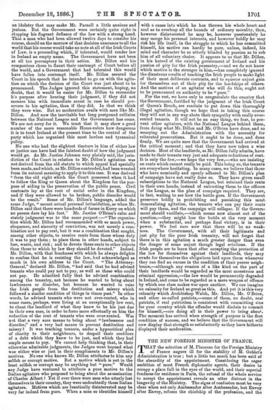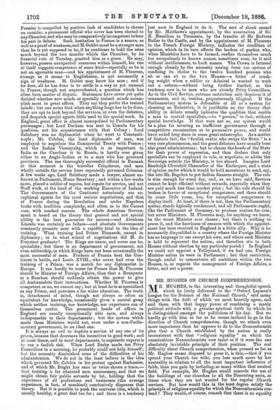THE NEW FOREIGN MINISTER OF FRANCE. T HAT the selection of
M. Flourens for the Foreign Ministry of France augurs ill for the stability of M. Goblet's Administration is true ; but a little too much has been said of the absurdity of the appointment. Considering the eager ambition of most French diplomatic agents, their desire to occupy a place full in the eyes of the world, and their especial fondness for residence in Paris, the refusal of the whole service to accept the appointment reveals an utter distrust in the longevity of the Ministry. The signs of confusion must be very clear when not only Ambassador after Ambassador, but Envoy after Envoy, refuses the chiefship of the profession, and the Premier is compelled by positive lack of candidates to choose an outsider, a permanent official who never has been elected to any Chamber, and who may be comparatively incompetent to bear his part in debate. Such hesitation in France is a source, as well as a proof of weakness, and M. Goblet must be a stronger man than he is yet supposed to be, if he continues to hold the reins much beyond the two months which the Chamber, by its financial vote of Tuesday, granted him as a grace. He may, however, possess unexpected resources within himself, his rise of itself suggests competence of some kind—especially as he is not an agreeable man—and his appointment of M. Flourens, strange as it seems to Englishmen, is not necessarily a sign of weakness. M. Goblet may know his man ; and if he does, all he has done is to settle in a way as yet unusual in France, though not unprecedented, a question which has often been matter of dispute. Statesmen have never yet quite decided whether new minds or specially trained minds accom- plish most in great offices. They say they prefer the trained minds ; but one notes that when anything large has to be done, they are apt to look beyond the services, or even the debaters, and despatch special agents little used to the special work. In England, great office is almost monopolised by Parliamentary personages ; but Lord Durham was sent to Canada for his qualities, not his acquaintance with that Colony ; Lord Salisbury was no diplomatist when he went to Constanti- nople; Mr. Cobden, the least diplomatic of men, was employed to negotiate the Commercial Treaty with France ; and the Indian Viceroyalty, which is as important to India as the Czardom is to Russia, is hardly ever given either to an Anglo-Indian or to a man who has governed provinces. The one thoroughly successful official in Burmah at this moment is the traveller Colquhoun, and men wholly outside the service have repeatedly governed Colonies. A few weeks ago, Lord Salisbury made a lawyer, almost un- known in Parliament, Home Secretary ; and within a few weeks -more, placed a soldier of repute, but repute for service, and not Staff work, at the head of the working Executive of Ireland. The Governments of the Continent notoriously use ex- ceptional agents for the most serious negotiations, and that of France during the Revolution and under Napoleon broke with tradition completely, and often, as in the Carnot case, with marked success. The whole American Govern- ment is based on the theory that general and not special ability is the best guarantee for success—and Abraham Lincoln was certainly no failure—and absolute Governments constantly promote men with a rapidity fatal to the idea of training. What training had Prince Bismarck, except in diplomacy ; or in what school of negotiations did M. de Freycinet graduate ? The Kings are never, and never can be, .specialists; but there is no department of government, not even soldiership, in which Kings have not been occasionally the most successful of men. Frederic of Prussia beat the Con- tinent in battle, and Louis XVIII, who never had even the training of a Prince, was a match for any diplomatist in Europe. It can hardly be worse for France that M. Flourens should be Minister of Foreign Affairs, than that a Bonaparte or a Bourbon should suddenly obtain the power to give all Ambassadors their instructions. Whether M. Flourens is competent or no, we cannot say; but at least he is as specialised as any Prince, and possesses a far wider education. The truth is, detachment of mind, though not always or often an equivalent for knowledge, occasionally gives a mental grasp which neither training, nor knowledge, nor experience can of themselves confer. The permanent heads of offices in England are usually exceptionally able men, and always indispensable to their departments ; but the system which made them Ministers would not, even under a non-Parlia- mentary government, be an ideal one. It is always an evil to deprive a service of any one of its prizes, because that decreases the incentives to good work; and at most times, and in most departments, to supersede experts is to run a foolish risk. When Lord Derby made ten Privy Councillors in a morning, he probably could not help himself; but the necessity diminished none of the difficulties of his administration. We do not in the least believe in the idea which governed Mr. Cobden in his protest against Embassies, and of which Mr. Bright has once or twice shown a trace,— that training is for educated men unnecessary, and that we might obtain fair public servants by lot, holding that the experience of all professions and businesses (the average experience, in fact, of mankind) conclusively disproves that theory. But it is possible to push the converse idea, which is usually healthy, a great deal too far ; and there is a tendency just now in England to do it. The sort of shock caused by Mr. Matthews's appointment, by the nomination of Sir R. Hamilton to Tasmania, by the transfer of Sir Redvers Buller to the Castle, and by the appointment of M. Flourens to the French Foreign Ministry, indicates the condition of opinion, which in its tarn affects the leaders of parties, who, when Ministries have to be formed, confine themselves much too scrupulously to known names, sometimes even, be it said without invidiousness, to hack names. The Crown is fettered enough already by the necessity arising from our system of confining its choice to the twelve hundred persons who sit or can sit in the two Houses—a fetter of crush- ing weight when a soldier or Admiral is wanted to work out a reform—without being further limited, as the tendency now is, to men who are already Privy Councillors. As to the Civil Service, extreme restriction only deprives it of ornaments, and is, besides, preposterously illogical. If the Parliamentary system is defensible at all as a system for choosing an Executive, it is justifiable on the theory that ability in debate usually indicates the qualities that enable a man to control specialists,—to "govern," in fact, without special knowledge. If that were not so, our system would be a plan for securing an inefficient government through a competitive examination as to persuasive power, and would have ended long since in some great catastrophe. As a matter of historic fact, the "foolish orator who sways the State" is a very rare phenomenon, and the great debaters have usually been also great administrators ; but to choose the heads of the State for their power of expression, and then declare that only specialists can be employed to rule, or negotiate, or advise the Sovereign outside the Ministry, is too absurd. Imagine Lord Randolph Churchill Chancellor of the Exchequer, and a state of opinion under which it would be held monstrous to send, say, the late Mr. Bagehot to put Indian finances straight. The rule is wise enough for every day, and, as we have said, Services cannot be kept efficient without rewards, especially when they are paid much less than market price ; but the rule should be broken in favour of exceptional competence, and there should be some little room, too, for exceptional competence to display itself. At least, if there is not, then the Parliamentary system stands logically condemned, and all Parliaments ought, like the Parliament of Germany, to produce orators for ever, but never Ministers. M. Flourens may, for anything we know, be the worst Minister ever chosen ; but there is nothing to prove it, and the hurricane of censure with which the appoint- ment has been received in England is a little silly. Why is he necessarily disqualified in a country where the Foreign Minister has no language to use except his own, and where each Minister is held to represent the nation, and therefore sits in both Houses without election by any particular parish ? In England we could not appoint a Talleyrand, if we had one, Foreign Minister unless he were in Parliament ; but that restriction, though useful to concentrate all ambitions within the two Houses, is, as regards the management of Foreign Affairs, a fetter, and not a power.











































 Previous page
Previous page